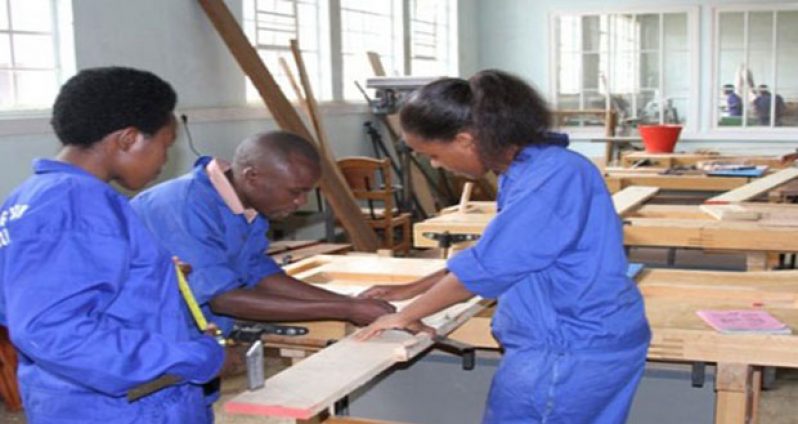-over 2,500 completing Secondary Competency Certificate Programme annually
By Ravin Singh
Technical and Vocational Education and Training (TVET) has taken on a stronger image in light of the fact that many of the world’s occupations, particularly those that aid development of industries, depend on people with the necessary skills. It is important to note that pursuing TVET programmes requires a strong background in Maths, Science and even English Language. In Guyana, the Education Ministry has been trying to change the way the population views TVET, and so far investments have been made in the construction of new institutes and facilities.
And even with a remarkably low school dropout rate of two percent, the incorporation of TVET into the school curriculum in Guyana is contributing to further reducing this rate.
This was the assertion of Assistant Chief Education Officer (Technical) Patrick Chinedu Onwuzirike who noted that TVET has been playing a critical role in the lives of many students.
According to statistics, which cover the period between 1995 and 2013, Guyana is leading the way in low school dropout rates in the region.
The data released by the Ministry of Education revealed that in the last 20 years Guyana has reduced the proportion of children dropping out at the general secondary level by more than 75 percent.
School dropout rates managed to decrease even as student enrollment in General Secondary Schools have increased by more than 30,000.
The statistics were released after a study done by the Inter-American Development Bank (IDB). The data suggested that Guyana has a dropout rate of two percent while countries like Jamaica, Trinidad and Tobago, Haiti and Barbados are prone to high dropout rates.
And the successes of this achievement by Guyana was credited, to some extent, to the incorporation of TVET in the school curriculum. Once such TVET related programme Onwuzirike pointed out, is the Secondary Competency Certificate Programme (SCCP) which was introduced in 2008.
This programme, he explained, seeks to reduce school dropouts, shore-up equity and enhance quality and relevance in the area of technical and vocational education at the Grade nine and Grade ten levels.
Noting that over the last three years approximately 2,500 students have been successfully completing the programme, the ACEO said that the competency-based modularized programme is designed with strong emphasis being placed on what students can do in the workplace after completion of training.
Additionally, the SCCP also serves as an alternative pathway for the acquisition of knowledge, skills and desirable attitudes that will prepare students for further training and/or the world of work.
And according to the ACEO, since the introduction of this programme, teachers in secondary schools have reported a reduction in the dropout rate in schools.
“There is no statistics at this time but we have been speaking to teachers and other educators and they have reported that these programmes are helping to reduce the dropout rates in schools… and what must be understood is that TVET has an academic component to it. It is not only about skills training” Onwuzirike.
In the SCCP, students are tested in four subject areas, Mathematics, English, Science and Social Studies and are asked to choose an elective. These electives include skill-related subjects such as Catering, Garment Construction, Electrical Installation, Masonry and Carpentry among others.
In light of the fact that students are required to undergo academic training as well, Onwuzirike sought to dispel the notion that TVET is solely about skill training and practical work as opposed to academic work.
“People think there is no academic side to this, but the truth is, students are required to do subjects which are offered in the normal school curriculum. You cannot be a Doctor or a Lawyer without demonstrating that you have the knowhow and the necessary requirements to hold those positions. Similarly, persons in skill-related work need to demonstrate that they have the skills and the knowhow to get the job done. Skill work is not a guessing game, so people have to be trained academically as well” he said.
And according to Onwuzirike, what is interesting to note, is the fact that TVET programmes allow the student to work at their own pace.
“This programme goes with the pace of the student… it goes with the capacity of them and what they are able to absorb within a given time.”
Meanwhile, Guyana has recently been authorised to grant Caribbean Vocational Qualifications (CVQs) certificates for the so-called technical and vocational subjects.
What this means is that carpenters, masons, plumbers and others with certification from the country’s technical institutes could soon be able to travel and work hassle-free in the Caribbean.
And according to Education Minister, Dr. Rupert Roopnaraine, the implication of this development has far-reaching effects for CARICOM.
“The movement of skills will be easily facilitated and accomplished, since all of the countries will be operating within one human resource development education system. It will also provide one trajectory for the engagement of the rest of the world with regard to the movement of skills beyond the region,” Dr. Roopnaraine state.
With the introduction of this accreditation, Onwuzirike said that what will be pursued is having the SCCP done at the grade nine level and the CVQ at the grade 10 level. In addition, he noted that moves are being made to streamline and have TVET permanently integrated into the school curriculum.
Some of the TVET subjects offered presently at the Caribbean Secondary Education Certificate (CSEC) are; Food and Nutrition, Building Technology, Technical Drawing, Visual Arts, etc.




.png)









